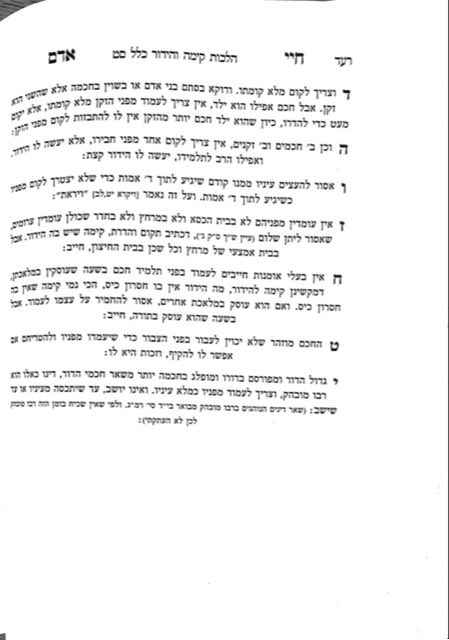We are discussing the halachos of kavod talmidei chachamim, specifically the halachos of hiddur. We know that there is a concept of vekidashto for a kohen, that we give him the first portion, give him to lead benching, and so on. The Gemara in Horayos teaches that the kavod deserved to a talmid chacham is greater than the kavod deserved to a kohen, so it would follow that a talmid chacham should also be served first, and before a kohen. The Gemara says that one should be mechabed a talmid chacham to speak first, and to lead the benching.
The Gemara in Megillah says that a talmid chacham who is mechabed a kohen am ha’aretz to lead benching is being mevazeh Torah, because people will think that the kehuna is greater than kavod hatorah. But, as explained in the Gemara in Horayos above, really kavod hatorah takes precedence. The chacham does not have to force himself to lead benching if he does not want to, but must understand his position and should not give it over to the kohen out of his own humility
A practical application of this point is that when a non-kohen leads benching, they will often say birshus hakohanim in the zimun. The Mishnah Berurah points out that technically, it is not sufficient to simply say birshus hakohanim, but rather one must actually ask for their permission before benching. Nevertheless, the minhag has become not to formally ask them, but to acknowledge them through the zimun. If a talmid chacham is benching, he does not need to state birshus hakohanim–nor is he allowed to–because he does not need the kohen’s reshus, and, as we saw above, he is not allowed to give it to the kohen.
The minhag in Telshe was that if one of the Rosh Yeshiva’s benched at a seudah, they did not say birshus hakohanim. Although they did not have to bench at every seudah, when they did, they did not need to ask reshus from the kohanim, as we have learned.
Rabbi Reingold was once in a shul where the rav led benching and did not say birshus hakohanim. Someone davening there condescendingly asked Rabbi Reingold why the rav did not say birshus hakohanim, and assumed that the rav was making a mistake. Rabbi Reingold explained that the rav has a similar status to the talmid chacham in that he does not need to ask for the reshus of the kohanim in his own shul, and that if this person would have respectfully asked the rav, he may have learned a new halacha.
Once there is no need to say birshus hakohanim, even if the one who ends up leading benching is not a talmid chacham, he may not need to say birshus hakohanim either. For example, in Telshe, since the Roshei Yeshiva were the baal habatim of the yeshiva, they could bench themselves or alternatively, give benching to whoever they wanted. That person, as it were, is in place of them, and they do not need to ask reshus from the kohanim, so that person would not need to say birshus hakohanim either. It was interesting to Rabbi Reingold that since it was so common in Telshe Yeshiva not to say brishus hakohanim, when he first heard someone say it, he was taken aback.
Summary
The kavod given to a talmid chacham precedes that of a kohen, so kibbudim given to a kohen–such as leading the benching, speaking first, etc–are given first to a talmid chacham.
Once the halacha is that a talmid chacham precedes a kohen, the talmid chacham does not need to ask the kohen for reshus when leading benching.



